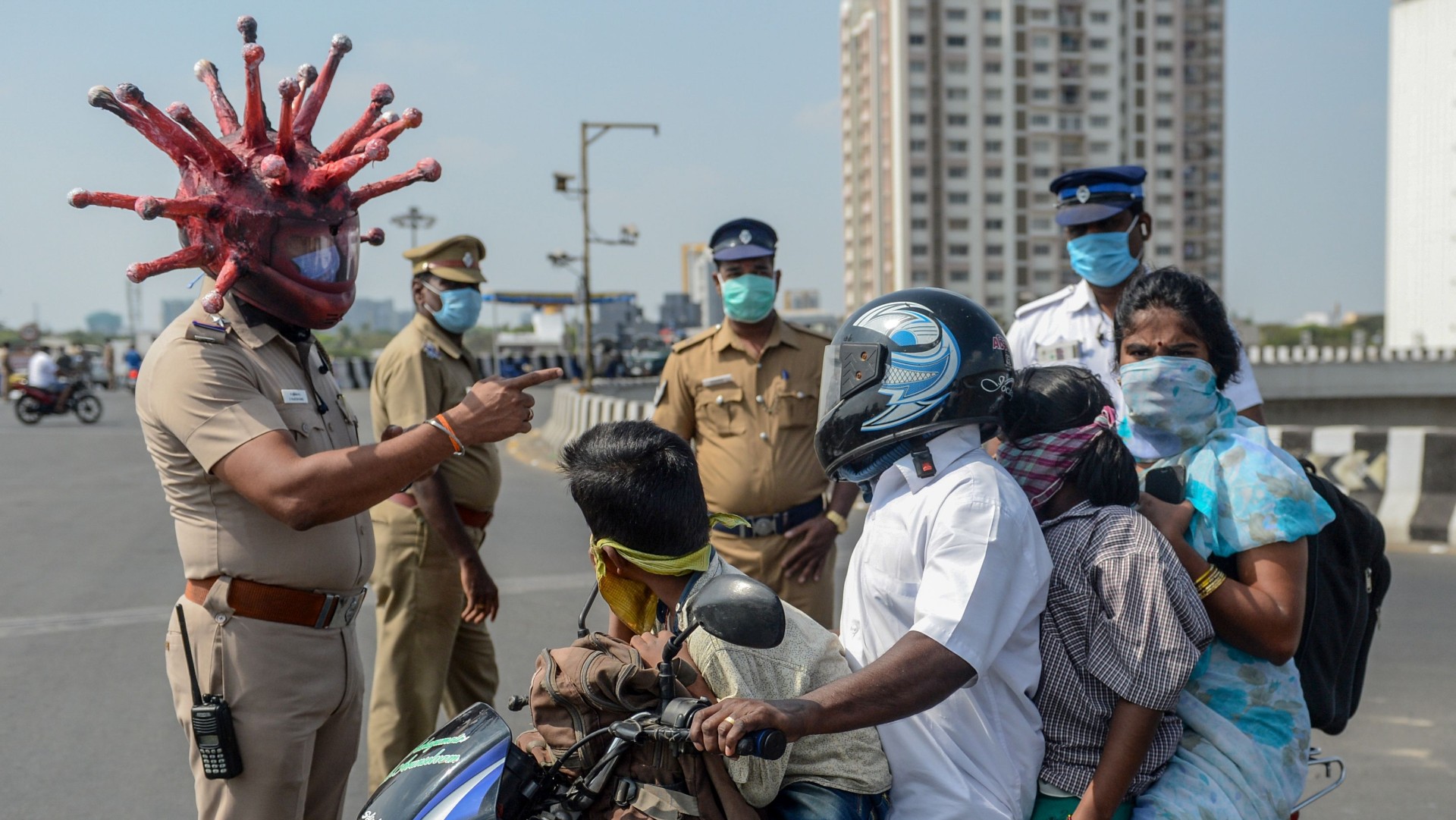Why has coronavirus not run rampant in India?
Experts puzzled by populous South Asian country’s limited outbreak

A free daily email with the biggest news stories of the day – and the best features from TheWeek.com
You are now subscribed
Your newsletter sign-up was successful
India is preparing to repatriate hundreds of thousands of nationals left stranded abroad as a result of the coronavirus pandemic, in what may become one of the largest emergency evacuations in decades.
The Indian government will begin returning nationals on military ships and chartered flights from Thursday, with almost 15,000 people to be flown home from a total of 12 countries in the first week of the operation alone, reports Chennai-based newspaper The Hindu.
How many of the 17 million Indians currently living abroad will seek repatriation remains to be seen, but “it is estimated that the number could rise to a million”, adds Germany’s Deutsche Welle.
The Week
Escape your echo chamber. Get the facts behind the news, plus analysis from multiple perspectives.

Sign up for The Week's Free Newsletters
From our morning news briefing to a weekly Good News Newsletter, get the best of The Week delivered directly to your inbox.
From our morning news briefing to a weekly Good News Newsletter, get the best of The Week delivered directly to your inbox.
One factor influencing their decision may be the limited extent of India’s coronavirus outbreak, with the South Asian nation and its neighbours accounting for a quarter of the world’s population but only 2% of global Covid-19 infections.
How many cases has India reported so far?
The past 24 hours have seen a steep rise in infections in India, with latest figures showing 3,852 new cases confirmed since the beginning of Tuesday. However, the country’s overall tally of infections is still startlingly low at just 46,476.
By comparison, the US has almost 1.2 million confirmed cases, in a population about a quarter of the size of that in India.
A free daily email with the biggest news stories of the day – and the best features from TheWeek.com
Why are there so few cases confirmed in India?
One possible explanation for the “puzzle” of India’s low rate of confirmed infections is the country’s poor testing capacity, says Foreign Policy.
As of the end of April, India had conducted only 830,201 tests, or 614 for every million people - among the lowest rates of testing in the world.
However, “if India’s low rate of testing were hiding a massive outbreak, it would show up in other ways”, says the Washington D.C.-based news site. Just 4% of the tests done to date have returned positive, compared with around 17% in the US, “implying that the virus is less widespread in India”.
India’s coronavirus death rate is also very low, at just 1,571 as of Tuesday morning.
Foreign Policy notes that “only one-fifth of deaths in India tend to be medically certified”, but adds that hospital admissions since the beginning of the year have been relatively normal - which again suggests that the infection rate remains low.
Other theories about India’s low reported infection and death rates include the comparative youth of the country’s population, the authorities’ speed and strictness in implementing nationwide lockdowns, and the success of their contact tracing programme.
Some experts and commentators have also suggested that warm weather may hamper the virus, or that certain medications including a widely deployed tuberculosis drug may boost resistance to the infection.
–––––––––––––––––––––––––––––––For a round-up of the most important stories from around the world - and a concise, refreshing and balanced take on the week’s news agenda - try The Week magazine. Start your trial subscription today–––––––––––––––––––––––––––––––
What next?
India began relaxing its coronavirus lockdown restrictions on Monday, “even as the pace of infection picked up”, reports Associated Press.
Some aspects of the lockdown will be kept in place at least until 18 May, but a “tentative return to normal life, albeit with masks, social distancing and stringent hygiene standards,” is beginning in areas nationwide that are deemed to be low risk, says the New York City-based news agency.
Yet India’s total infection rate has begun to rise significantly, according to the Brookings Institution think tank.
“Active cases now growing at 5.5%, so doubling every 13 days. Not good. Hotspot management (containment and contact tracing and testing) needs to be much better,” tweeted Brookings Institute fellow Professor Shamika Ravi.
The country has also seen its biggest single-day jump in deaths linked to the illness, with 195 Covid-19 patients dying in the last 24 hours, New Delhi Television reports today.
The statistics add weight to growing fears that India’s outbreak “has yet to peak”, says The New York Times.
Rather than bringing the outbreak under control, limited interactions between people may simply have bought the Indian authorities “time to prepare”, says Ramanan Laxminarayan, an epidemiologist and economist at Washington D.C.’s Center for Disease Dynamics, Economics and Policy.
Arion McNicoll is a freelance writer at The Week Digital and was previously the UK website’s editor. He has also held senior editorial roles at CNN, The Times and The Sunday Times. Along with his writing work, he co-hosts “Today in History with The Retrospectors”, Rethink Audio’s flagship daily podcast, and is a regular panellist (and occasional stand-in host) on “The Week Unwrapped”. He is also a judge for The Publisher Podcast Awards.
-
 Sepsis ‘breakthrough’: the world’s first targeted treatment?
Sepsis ‘breakthrough’: the world’s first targeted treatment?The Explainer New drug could reverse effects of sepsis, rather than trying to treat infection with antibiotics
-
 James Van Der Beek obituary: fresh-faced Dawson’s Creek star
James Van Der Beek obituary: fresh-faced Dawson’s Creek starIn The Spotlight Van Der Beek fronted one of the most successful teen dramas of the 90s – but his Dawson fame proved a double-edged sword
-
 Is Andrew’s arrest the end for the monarchy?
Is Andrew’s arrest the end for the monarchy?Today's Big Question The King has distanced the Royal Family from his disgraced brother but a ‘fit of revolutionary disgust’ could still wipe them out
-
 A Nipah virus outbreak in India has brought back Covid-era surveillance
A Nipah virus outbreak in India has brought back Covid-era surveillanceUnder the radar The disease can spread through animals and humans
-
 How music can help recovery from surgery
How music can help recovery from surgeryUnder The Radar A ‘few gentle notes’ can make a difference to the body during medical procedures
-
 Covid-19 mRNA vaccines could help fight cancer
Covid-19 mRNA vaccines could help fight cancerUnder the radar They boost the immune system
-
 The new Stratus Covid strain – and why it’s on the rise
The new Stratus Covid strain – and why it’s on the riseThe Explainer ‘No evidence’ new variant is more dangerous or that vaccines won’t work against it, say UK health experts
-
 RFK Jr. vaccine panel advises restricting MMRV shot
RFK Jr. vaccine panel advises restricting MMRV shotSpeed Read The committee voted to restrict access to a childhood vaccine against chickenpox
-
 RFK Jr. scraps Covid shots for pregnant women, kids
RFK Jr. scraps Covid shots for pregnant women, kidsSpeed Read The Health Secretary announced a policy change without informing CDC officials
-
 New FDA chiefs limit Covid-19 shots to elderly, sick
New FDA chiefs limit Covid-19 shots to elderly, sickspeed read The FDA set stricter approval standards for booster shots
-
 RFK Jr.: A new plan for sabotaging vaccines
RFK Jr.: A new plan for sabotaging vaccinesFeature The Health Secretary announced changes to vaccine testing and asks Americans to 'do your own research'